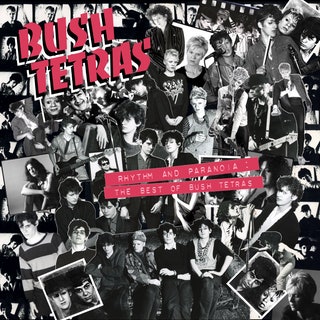This 3xLP box set surveys the influential New York group’s long career, reinforcing their post-punk bona fides and tracing their evolution over the course of four decades.
Bush Tetras never wanted to be pigeonholed as a no wave band. Though guitarist Pat Place co-founded the group after leaving no-wave luminaries the Contortions in 1979, bringing roadie Laura Kennedy as Bush Tetras’ original bassist, they outlasted the short-lived but deeply influential NYC underground movement, evolving through multiple eras. In a 2019 interview, late drummer Dimitri Papadopoulos (better known as Dee Pop) explained that they consider themselves to be “part of the lineage of great bands that evolved from the CBGB’s scene” such as the Ramones, Television, or Patti Smith. Across 29 songs (plus two digital-only bonus tracks), this chronologically organized 3xLP box set compiles highlights from each of Bush Tetras’ periods of recorded output—the early 1980s, late 1990s, and late 2010s—revealing just how vital they remained in each decade.
While Bush Tetras can and should be considered a quintessential New York band, Dee Pop is the only member who grew up in Queens. Place moved to the city from the suburbs of Chicago with aspirations of becoming a visual artist, joining the Contortions after playing guitar for only three weeks. Kennedy arrived in NYC from Detroit, and singer Cynthia Sley from Cleveland, both drawing on inspirations from Motown and James Brown. Sley recalled Bush Tetras hanging out in the Harlem hip-hop scene with rapper Fab 5 Freddy, who teamed up with Blondie for the Christmas-themed remix of their song “Rapture.” Thanks to these diverse influences, they arrived at a sound fusing no wave discordance with relentlessly funky post-punk and mutant disco, zipped up as tight as a leather jacket.
Bush Tetras’ debut single, “Too Many Creeps,” has been their calling card since it hit the streets in 1980. Following Glenn Branca’s Lesson No. 1 as the second release from tastemaking NYC label 99 Records, this timeless classic laid out the quartet’s approach with a rumbling bassline and tough-as-nails attitude. Sley has described the song as an “anti-anthem” about how they were forced to “dodge the dangerous creeps who were both hitting on us or hassling us about our androgynous looks.” She returned to this lyrical theme on the dubby “Das Ah Riot,” released the next year on a 7" from UK label Fetish, delivering a thinly veiled threat: “When the heat pick up the street/You’re gonna hope we never meet.” Over a groove that moves like a freaky trip to “Funkytown,” her empowering words point to a place beyond frustration on “Stand Up and Fight,” as Sley urges listeners to “Come on and take control/Lose your body/Lose your soul.”
Even when they set their sights on the dancefloor, Bush Tetras offered ultimatums. “You Can’t Be Funky,” another signature song from the band’s 1981 Rituals EP, cuts aspiring suitors to the core: “Your eyes are shallow/And your glance is cold/You can’t be funky if you haven’t got a soul!” This 12", released by Stiff Records and produced by the Clash’s drummer Topper Headon, marked a striking divergence from Bush Tetras’ earliest material as they blurred the line between no wave and new wave. Sley’s quivering vocals on the cowbell-clopping “Cowboys in Africa” are reminiscent of Jello Biafra, while the title track, “Rituals,” drifts into a spookier psychedelic sound, hinting at the music Dee Pop would make with the Gun Club several years later.
As they moved into the ’90s, Bush Tetras squabbled over creative directions. Prior to his time playing with free-jazz bassist William Parker and saxophonist Andy Haas, Dee Pop’s inclinations had already shifted from punk to avant-garde, while Place remained interested in a different alternative. “How are we going to meld Soundgarden with Albert Ayler?” he wondered. They didn’t end up sounding much like either. “Page 18,” from a 7" produced by Henry Rollins, is supercharged with screams hair-raising enough to make Lydia Lunch shake in her boots. “Mr. Lovesong,” featuring the legendary Darlene Love, is an unlikely collision of girl-group pop and groovy death rock. This era culminates with “You Don’t Know Me,” the squealing standout of Bush Tetras’ second album, Happy. Sounding just as pissed off as anything from the previous decade, Sley sarcastically comments on a veteran underground artist’s place in the pantheon: “I’m nailed/Hailed/Impaled/Then forgotten.”
In a 2015 interview, Sley remarked how Bush Tetras’ snarling exterior and determination to speak their minds set them apart from many of their peers: “You see the other bands with women up front, like the Go-Go’s and the Bangles, and we were totally alien compared to them.” On their best songs from recent years, such as 2018’s “Red Heavy,” Bush Tetras still sound like nobody else. New bassist Val Opielski lays down a mesmerizing, slow-moving groove as the founding trio thrashes and bashes like it’s done for the past four decades.
Sadly, Dee Pop passed away just one month before the box set’s release, making it as much a monument to his life as to the band’s legacy. Until this collection, keeping track of Bush Tetras recordings spread across labels, continents, and decades has felt like a daunting task. Rhythm and Paranoia provides a definitive overview of their trajectory, integrating influences from each era while balancing on the twin pillars of tough and funky. They might never become household names, but Bush Tetras’ place in the New York lineage has been cemented.












0 comments:
Post a Comment